七年级英语下册Unit5
人教版英语七年级下Unit5全单元

第二十一页,共70页。
询问某人或某物来自某处 结构:Where + be+主语+from?
回答:主语 + is/are from ...... 也可以直接回答地点。
be from= come from 意为“从.....来”
eg: 你来自哪里? Where are you from ? eg :我来自中国。
I don’t like __l_io_n_s___ because they’re lazy.
第二十五页,共70页。
3c. Guess animals.
A: Is this animal big? B: Yes, it is.
A: Where’s the animal from?
B: It’s from China.
D. red
5. She likes ____B_ during the day.
A. to sleeping B. sleeping C. sleep D. to sleeps
6. There are ______ hours in a day.
C
A. seven
B. twelve C. twenty-four
一种 各种各样
This book is kind of interesting .
kind 善良 be kind to sb 对某人友善
他对我们很友善
He is kind to us.
第十九页,共70页。
形 容 词
adj.
cute 可爱的 beautiful 美丽的
lazy 懒惰的
scary 可怕的
A: Let’s see the koalas. B: Why do you want to see them?
仁爱英语七年级下册Unit 5 知识点
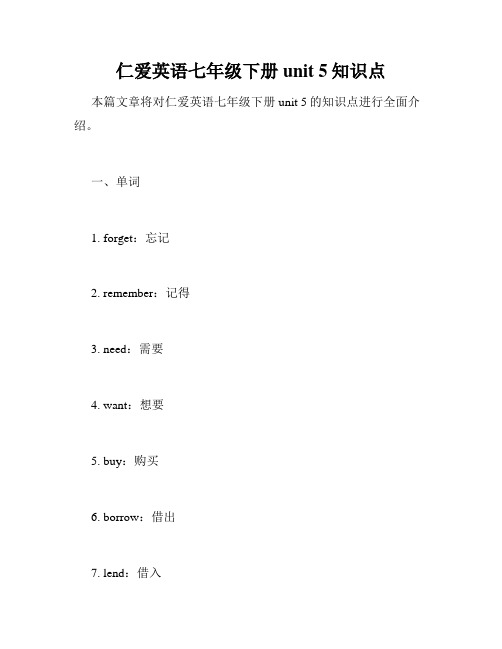
仁爱英语七年级下册unit 5知识点本篇文章将对仁爱英语七年级下册unit 5的知识点进行全面介绍。
一、单词1. forget:忘记2. remember:记得3. need:需要4. want:想要5. buy:购买6. borrow:借出7. lend:借入8. pay:支付9. cost:花费10. heavy:重的11. light:轻的12. thin:薄的13. thick:厚的14. long:长的15. short:短的16. small:小的17. big:大的18. hot:热的19. cold:冷的二、语法1. 情态动词情态动词包括can/could, may/might, must, should/ought to等,用于表示说话人的态度、意愿、可能性、推测等。
比如:I can swim.(我会游泳。
)You must finish your homework.(你必须完成作业。
)2. 定冠词和不定冠词定冠词the用于特指某一事物,比如the book(那本书);不定冠词a/an用于泛指某一个,比如an apple(一个苹果)。
3. 物主代词我、你、他、她、它等人称代词后面加上我的、你的、他的、她的、它的等词,就构成了物主代词。
比如:I lost my bag.(我丢了我的书包。
)4. 名词的复数在名词后面加-s或-es来表示复数形式,比如books(书)、boxes(箱子)。
5. 副词副词是用来修饰动词、形容词、副词和句子的。
常用的副词有often, always, sometimes等。
6. 数词数词是用来表示数目、数量的词语。
基数词表示数量,比如one(1)、two(2)等;序数词表示顺序,比如first(第一)、second(第二)等。
三、阅读理解这个单元包含了一篇短文,提供了购物建议。
阅读理解是考查学生字义理解能力的一种方式,要求同学们读懂短文,并理解其内容。
四、写作技能写作技能涉及到学生组织语言,进行人际交流的能力。
人教版七年级英语下册Unit5知识点归纳

Unit5 Why do you like pandas?知识点归纳一、重点短语1. importance in Thailand 在泰国的重要性2. Let’s see…. first. 让我们先看...3. favorite animals 最喜欢的动物4. kind of interesting 有点有趣5. South Africa 南非6. be from =come from 来自7. be smart 聪明的8. walk on two legs 用两条腿走9. all day/all night 整天/整夜10. a good name for her 对于她是个好名字11. like …a lot 非常喜欢......12. black and white 黑白相间13. You’re right. 你是正确的。
14. one of +名词复数(......其中之一)15. our first flag 我们的第一面旗16. a symbol of good luck 好运的象征17. draw well 画得好18. forget to do 忘记做某事19. get/be lost 迷路20. places with food and water有食物和水的地方21. be in great danger 处于危险22. cut down 砍倒23. over = more than 超过/多于24 be made of... 由…制成25.Thai Elephant Day 大象二、用法归纳1. —Why…? 为什么……?—Because… 因为……2. let sb. do sth. 让某人做某事3. want to do sth. 想要做某事4. one of+名词复数……之一5. forget to do sth. 忘记要做某事6. forget doing sth. 忘记做过某事7. help sb. (to) do sth. 帮助某人做某事8. be friendly to sb. 对某人友好三、重点句子1. —Why do you like pandas? 你为什么喜欢熊猫?—Because they’re kind of interesting. 因为它们有点儿有趣。
(完整版)人教版七年级英语下册Unit5知识点讲解
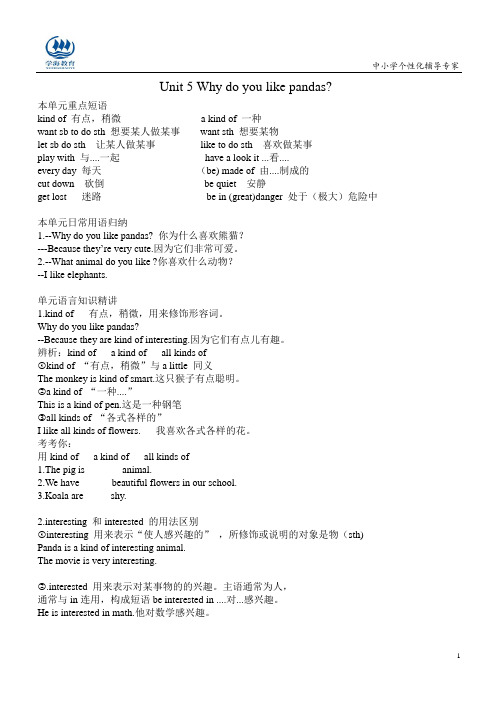
Unit 5 Why do you like pandas?本单元重点短语kind of 有点,稍微 a kind of 一种want sb to do sth 想要某人做某事want sth 想要某物let sb do sth 让某人做某事like to do sth 喜欢做某事play with 与....一起have a look it ...看....every day 每天(be) made of 由....制成的cut down 砍倒be quiet 安静get lost 迷路be in (great)danger 处于(极大)危险中本单元日常用语归纳1.--Why do you like pandas? 你为什么喜欢熊猫?---Because they’re very cute.因为它们非常可爱。
2.--What animal do you like ?你喜欢什么动物?--I like elephants.单元语言知识精讲1.kind of 有点,稍微,用来修饰形容词。
Why do you like pandas?--Because they are kind of interesting.因为它们有点儿有趣。
辨析:kind of a kind of all kinds of①kind of “有点,稍微”与a little 同义The monkey is kind of smart.这只猴子有点聪明。
②a kind of “一种....”This is a kind of pen.这是一种钢笔③all kinds of “各式各样的”I like all kinds of flowers. 我喜欢各式各样的花。
考考你:用kind of a kind of all kinds of1.The pig is _______animal.2.We have ______beautiful flowers in our school.3.Koala are _____shy.2.interesting 和interested 的用法区别①interesting 用来表示“使人感兴趣的”,所修饰或说明的对象是物(sth) Panda is a kind of interesting animal.The movie is very interesting.②.interested 用来表示对某事物的的兴趣。
人教版七年级英语(下册)Unit 5词汇、句型精讲
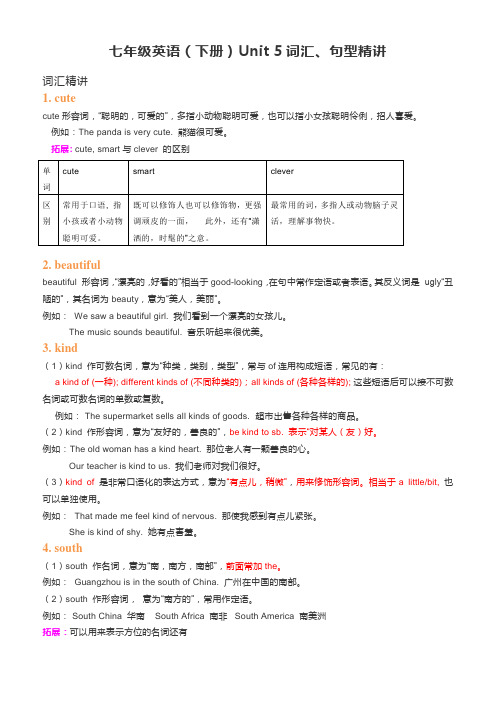
east(东),west(西),north(北), southeast (东南)southwest(西南), northwest (西北),northeast (东北)。
5. sleep(1)sleep作动词,意为“睡,睡觉”,指睡,睡着的全过程,强调睡眠的持续状态,后面可以跟副词或者介词。
例如:Don’t cry, the baby is sleeping. 别哭,那个婴儿在睡觉。
I can’t sleep because of the noise. 嘈杂声吵得我睡不着觉。
Did you sleep well last night? 你昨晚睡得好吗?(2)sleep 做名词,意为“睡觉,睡眠”,常为不可数名词。
但sleep前面有形容词时,可在前面加上a (an), 表示“一段……睡眠”。
词组go to sleep意为“入睡,睡着”。
例如:I need to have some sleep. 我需要睡一会儿。
Did you have a good sleep last night? 你昨天晚上睡得好吗?(3)asleep和sleepy 都是sleep的形容词形式。
asleep 表示“睡着的”,属于表语形容词,词组fall asleep 意为“睡着”;sleepy意为“困倦的,想入睡的”,既可以作定语也可以作表语。
例如:He fell asleep soon. 他很快睡着了。
I’m very sleepy. 我很困。
6. friendlyfriendly 是由名词friend + -ly 构成的形容词,意为“友好的”。
其反义词为unfriendly,意为“不友好的”。
例如:Chinese people are very friendly. 中国人民很友好。
类似的构词还有:love + -ly——lovely 可爱的mother + -ly —— motherly 母亲般的week + -ly —— weekly 每周的拓展:(1)be friendly to sb. 意为“对……友好”,指对别人态度好,热情;相当于“be kind to sb.”。
仁爱版七年级英语下册unit5知识点
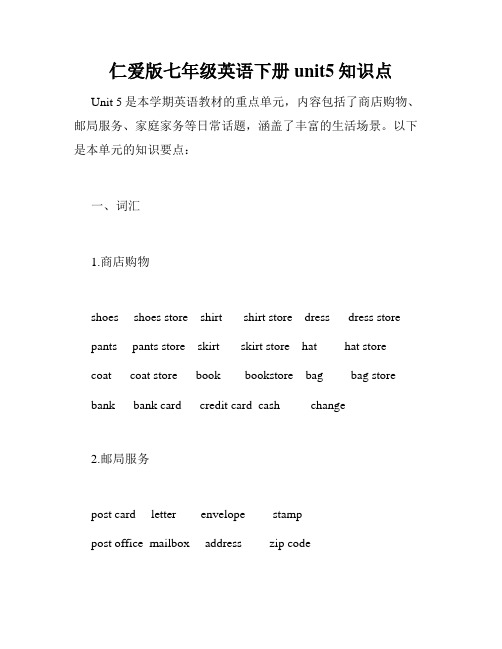
仁爱版七年级英语下册unit5知识点Unit 5是本学期英语教材的重点单元,内容包括了商店购物、邮局服务、家庭家务等日常话题,涵盖了丰富的生活场景。
以下是本单元的知识要点:一、词汇1.商店购物shoes shoes store shirt shirt store dress dress storepants pants store skirt skirt store hat hat storecoat coat store book bookstore bag bag storebank bank card credit card cash change2.邮局服务post card letter envelope stamppost office mailbox address zip code3.家庭家务clean clean up sweep mopwash laundry fold drydish do the dishes set the table clear the table二、重点语法本单元的语法重点是一般现在时和there be句型的运用。
1.一般现在时一般现在时通常用来表示反复发生的动作、习惯性的行为或者现在的状态。
它的构成方式是主语+动词原形+其他。
注意第三人称单数形式应该在动词后面加上“s”。
例如:I often go shopping on weekends. (我经常在周末去购物。
)She always buys books in the bookstore. (她总是在书店买书。
)2.there be句型there be句型用来表示某地或某处有某物。
当表示单数或者不可数名词时,应该用there is;当表示复数名词时,应该用there are。
例如:There is a bank in front of the bookstore. (书店前面有一家银行。
)There are some chairs in the classroom. (教室里有一些椅子。
人教版英语七年级下册单元Unit 5 知识点+测试卷+思维导图
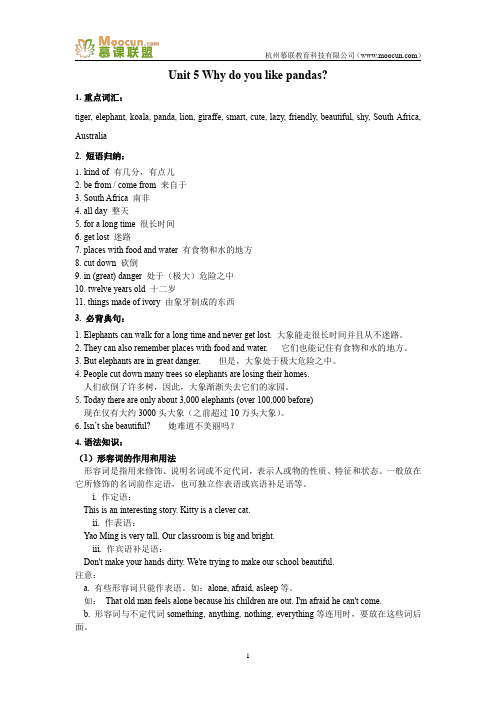
Unit 5 Why do you like pandas?1.重点词汇:tiger, elephant, koala, panda, lion, giraffe, smart, cute, lazy, friendly, beautiful, shy, South Africa, Australia2. 短语归纳:1.kind of 有几分,有点儿2. be from / come from 来自于3. South Africa 南非4. all day 整天5. for a long time 很长时间6. get lost 迷路7. places with food and water 有食物和水的地方8. cut down 砍倒9. in (great) danger 处于(极大)危险之中10. twelve years old 十二岁11. things made of ivory 由象牙制成的东西3. 必背典句:1. Elephants can walk for a long time and never get lost. 大象能走很长时间并且从不迷路。
2. They can also remember places with food and water. 它们也能记住有食物和水的地方。
3. But elephants are in great danger. 但是,大象处于极大危险之中。
4. People cut down many trees so elephants are losing their homes.人们砍倒了许多树,因此,大象渐渐失去它们的家园。
5. Today there are only about 3,000 elephants (over 100,000 before)现在仅有大约3000头大象(之前超过10万头大象)。
6.Isn’t she beautiful? 她难道不美丽吗?4.语法知识:(1)形容词的作用和用法形容词是指用来修饰、说明名词或不定代词,表示人或物的性质、特征和状态。
人教版七年级英语下册unit5(详细内容)
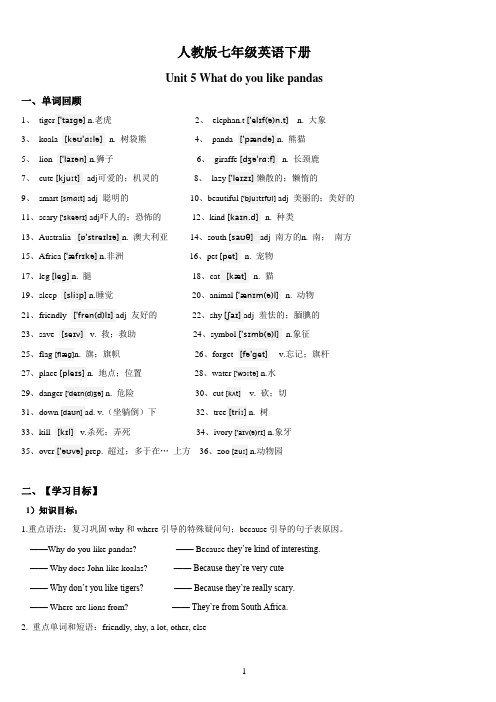
人教版七年级英语下册Unit 5 What do you like pandas一、单词回顾1、tiger['taɪgə] n.老虎2、elephan.t['elɪf(ə)n.t]n. 大象3、koala [kəʊ'ɑːlə]n. 树袋熊4、panda ['pændə] n. 熊猫5、lion ['laɪən] n.狮子6、giraffe [dʒə'rɑ:f]n. 长颈鹿7、cute [kjuːt]adj可爱的;机灵的8、lazy ['leɪzɪ]懒散的;懒惰的9、smart [smɑːt] adj 聪明的10、beautiful ['bjuːtɪfʊl] adj 美丽的;美好的11、scary ['skeərɪ] adj吓人的;恐怖的12、kind [kaɪn.d]n. 种类13、Australia [ɒ'streɪlɪə] n. 澳大利亚14、south [saʊθ]adj 南方的n. 南;南方15、Africa ['æfrɪkə]n.非洲16、pet [pet]n. 宠物17、leg [leg]n. 腿18、cat[kæt]n. 猫19、sleep [sliːp]n.睡觉20、animal ['ænɪm(ə)l]n. 动物21、friendly ['fren(d)lɪ]adj 友好的22、shy [ʃaɪ]adj 羞怯的;腼腆的23、save [seɪv]v. 救;救助24、symbol['sɪmb(ə)l]n.象征25、flag [flæg]n. 旗;旗帜26、forget [fə'get]v.忘记;旗杆27、place [pleɪs]n. 地点;位置28、water ['wɔːtə] n.水29、danger ['deɪn(d)ʒə] n. 危险30、cut [kʌt]v. 砍;切31、down [daʊn] ad. v.(坐躺倒)下32、tree[triː] n. 树33、kill [kɪl]v.杀死;弄死34、ivory ['aɪv(ə)rɪ] n.象牙35、over['əʊvə] prep. 超过;多于在…上方36、zoo [zuː] n.动物园二、【学习目标】1)知识目标:1.重点语法:复习巩固why和where引导的特殊疑问句;because引导的句子表原因。
人教版七年级英语下册unit5(详细内容)

tiger ['ta ['taɪɪg ə] n.elephan.t ['el ['elɪɪf(f(əə)n.t] koala [k [kəʊəʊəʊ''ɑːlə] panda ['pænd ['pændəə] n. lion ['la ['laɪəɪəɪən] n] n.giraffe [d [dʒəʒəʒə'r 'r 'rɑ:f]ɑ:f] cute [kjuːt] lazy ['le ['leɪɪz ɪ] 懒散的;懒惰的懒散的;懒惰的 smart [sm [smɑːt]ɑːt] adj beautiful ['bjuːtɪ['bjuːtɪf f ʊl] adj scary ['ske ['skeəər ɪ] adj kind [ka [kaɪɪn.d] Australia [ɒ'stre 'streɪɪl ɪəɪə] ] south [sa [saʊθ]ʊθ] adj Africa ['æfr ['æfrɪɪk ə] n.pet [pet] leg [leg] n. cat [kæt] sleep [sliːp] n.animal ['æn ['ænɪɪm(m(əə)l] friendly ['fren(d)l ['fren(d)lɪɪ] adj shy [ʃa ɪ] adj save [se [seɪɪv] symbol ['s ['sɪɪmb(mb(əə)l] flag [flæg]n. [f [fəə'get] place [ple [pleɪɪs] n. water ['w ['wɔːtəɔːtəɔːtə]] n.danger ['de ['deɪɪn(d)n(d)ʒəʒəʒə]] n. cut [k [kʌʌt] down [da [daʊʊn] ad. v.tree [triː] n. kill [k [kɪɪl] ivory ['a ['aɪɪv(v(əə)r )rɪɪ] n.over ['['əʊəʊəʊv v ə] prep. zoo [zuː] n.2)【学习重难点】1.why 1.why 和和 because because 引导的句子。
人教版初中英语七年级下册UNIT5知识点精析

人教版初中英语七年级下册UNIT5知识点精析七年级下册UNIT5Why do you like pandas?你为什么喜欢熊猫?重点●提建议的句型●forget的用法难点●why 引导的特殊疑问句●形容词的用法语法●why引导的特殊疑问句;形容词的用法公众号Section A重点单词panda熊猫zoo 动物园tiger 老虎elephant大象lion狮子giraffe 长颈鹿animal动物cute 可爱的;机灵的lazy懒散的;懒惰的smart 聪明的beautiful美丽的;美好的kind种类Australia 澳大利亚south南方的;南,南方Africa 非洲pet 宠物cat猫leg 腿sleep 睡觉重点短语kind of 稍微;有点儿South Africa 南非black and white 黑白相间重点句型1.Let's see the pandas first.咱们先看熊猫吧。
2.They're my favorite animals.它们是我最喜欢的动物。
3.Where are they from?它们来自哪里?4.She sleeps all day...她整天睡觉......Section B重点单词friendly友好的shy 羞怯的;腼腆的save救;救助flag旗;旗帜place地点;位置forget忘记;遗忘water 水danger危险cut砍;切down(坐、躺、倒)下;向下;沿着tree树kill杀死;弄死over超过,多于;在……上方重点短语get lost 迷路be in(great) danger 处于(极大)危险之中lose one's home失去某人的家园cut down 砍倒(be)made of 由……制成的重点句型1.The elephant is one of Thailand's symbols.大象是泰国的象征之一。
人教版七年级下册英语unit5知识点+经典练习题
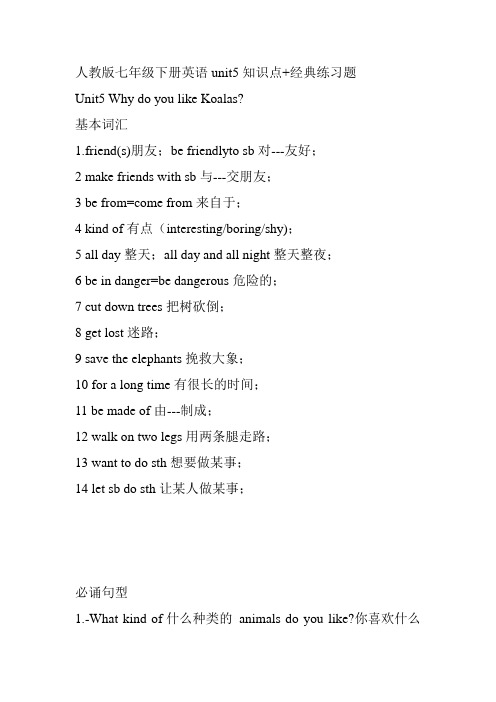
人教版七年级下册英语unit5知识点+经典练习题Unit5 Why do you like Koalas?基本词汇1.friend(s)朋友;be friendlyto sb对---友好;2 make friends with sb与---交朋友;3 be from=come from来自于;4 kind of有点(interesting/boring/shy);5 all day整天;all day and all night整天整夜;6 be in danger=be dangerous危险的;7 cut down trees把树砍倒;8 get lost迷路;9 save the elephants挽救大象;10 for a long time有很长的时间;11 be made of由---制成;12 walk on two legs用两条腿走路;13 want to do sth想要做某事;14 let sb do sth让某人做某事;必诵句型1.-What kind of什么种类的animals do you like?你喜欢什么种类的动物啊?-I like elephants/penguins/monkeys.猴子-Why do you like你为何喜欢elephants/penguins/penguins? -Because因为they are cute/smart.2.-What other别的animals do you like?你还喜欢别的什么动物吗?3.-Why does John like koalas?-Because they’re very smart.4.-Why don’t you like tigers?你为什么不喜欢老虎啊?-Because they’re really scary.5(1)-Why do you like PE?-Because it is (kind of有点)exciting令人兴奋的/relaxing令人放松的6(1)-Where are you from?-I’m from Beijing,China.(2)-Where do you come from?-I come from Paris,France.7 (1)-Where’s the an imal from?-It’s from China.(2)-Where’re lions from?-They’re from South Africa.(3)We are students from Australia.8.Jenny is kind of shy有点害羞,she can’t say a word说不出一句话The story is kind of interesting.有点趣味9.Please be quiet!请保持安静!10(1).The elepnants are in great danger.非常危险We want to save the elephants.挽救大象Unit5:Why do you like Koalas? 经典练习One:单词填空1.He usually_______himself(放松自己)by listening to tapes.2.Mary is a______girl,she doesn’t like talking to others.3.Tom is_______.he doesn’t do his homework.4.My English teacher is kind,she sh very friendly_____us students.5.You are so kind,can I make________with you?(和---交朋友)6.An elephant is an_________animal.7.I like koala bears______they’re cute.8.Elephants are kind______interesting.9.I like dolphins but my brother______pandas.10.These lions are______Afria.Two:单项选择1( )Do you want______the tiger?A.seeB.to have a lookC.to see2( )Pandas are______interesting.A.a kind ofB.a kindC.kind of3( )-____Does she like pandas?/-Because they are cute.A.WhatB.HowC.Why4( )I____you have a good day. A.want B.hope C.like5( )Please let Lily_____the homeweok by herself. A.to do B.do C.doing6( )Look!The elephant______grass and leaves. A.eat B.eats C.is eating7( )Tom___to bed early but his brother doesn’t. A.goes B.is going C.go8( )-_____animals do you like?/-I like penguins. A.what B.How C.whose9( )He wants_____the zoo A.go to B.to go C.to go to10( )Where_____Tom and Mike from?A.is B.are C.does11( )There is____elephant in the zoo,____elephant is from Africa.A./,AnB.an,TheC.a,The12( )Mr Li is kind____us,but sometimes he is kind____serious 严肃。
人教版七年级下册英语Unit5说课稿

人教版七年级下册英语Unit 5 说课稿一. 教材分析人教版七年级下册英语Unit 5主要讲述了日常生活中的一些活动,如做家务、上学、看电影等。
本单元的核心词汇有housework, homework, watch, read, sports 等,同时本单元还涉及到一般现在时的用法。
通过本单元的学习,学生能够掌握日常生活中的一些基本表达,并能用英语描述自己的日常活动。
二. 学情分析七年级的学生已经具备了一定的英语基础,能够进行简单的英语交流。
但是,部分学生对于一般现在时的用法还不是很清楚,需要老师在教学中进行详细的解释和引导。
此外,学生在口语表达方面还存在一定的困难,需要老师提供更多的机会进行实践和锻炼。
三. 说教学目标1.知识目标:学生能够掌握Unit 5中的核心词汇和短语,理解一般现在时的用法。
2.能力目标:学生能够用英语描述自己的日常活动,进行简单的交流。
3.情感目标:通过学习,学生能够培养对英语的兴趣,增强学习的自信心。
四. 说教学重难点1.重点:学生能够掌握Unit 5中的核心词汇和短语,理解一般现在时的用法。
2.难点:学生能够运用一般现在时描述自己的日常活动,并进行口语交流。
五. 说教学方法与手段1.教学方法:采用任务型教学法,让学生在实际操作中掌握知识,提高能力。
2.教学手段:利用多媒体课件、图片、卡片等辅助教学,增加课堂的趣味性。
六. 说教学过程1.导入:通过展示图片,引导学生谈论自己喜欢的活动,引出本课主题。
2.新课呈现:通过多媒体课件,展示本课的核心词汇和短语,讲解一般现在时的用法。
3.操练:学生分组进行角色扮演,运用一般现在时描述自己的日常活动。
4.巩固:学生完成课堂练习,检测对知识的掌握情况。
5.拓展:引导学生谈论自己的梦想,用英语表达对未来生活的期望。
6.总结:对本课内容进行总结,强调一般现在时的用法。
七. 说板书设计板书设计如下:人教版七年级下册英语Unit 5核心词汇:housework, homework, watch, read, sports等一般现在时:主语 + 动词原形八. 说教学评价1.课堂参与度:观察学生在课堂上的参与情况,是否积极回答问题,参与讨论。
七年级下册英语第5单元
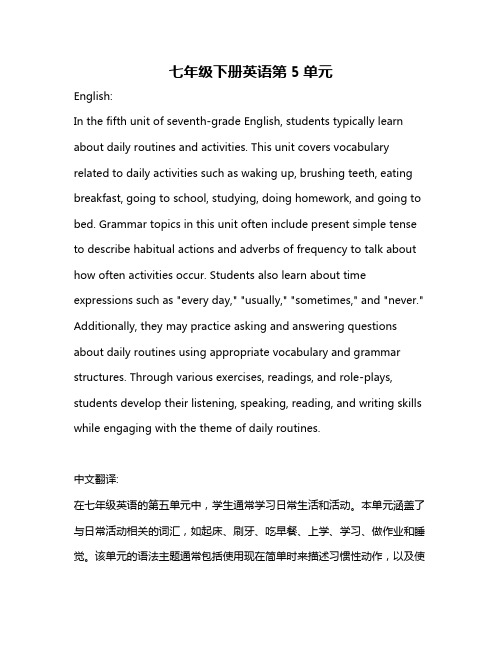
七年级下册英语第5单元English:In the fifth unit of seventh-grade English, students typically learn about daily routines and activities. This unit covers vocabulary related to daily activities such as waking up, brushing teeth, eating breakfast, going to school, studying, doing homework, and going to bed. Grammar topics in this unit often include present simple tense to describe habitual actions and adverbs of frequency to talk about how often activities occur. Students also learn about time expressions such as "every day," "usually," "sometimes," and "never." Additionally, they may practice asking and answering questions about daily routines using appropriate vocabulary and grammar structures. Through various exercises, readings, and role-plays, students develop their listening, speaking, reading, and writing skills while engaging with the theme of daily routines.中文翻译:在七年级英语的第五单元中,学生通常学习日常生活和活动。
人教七年级下册英语U5知识点
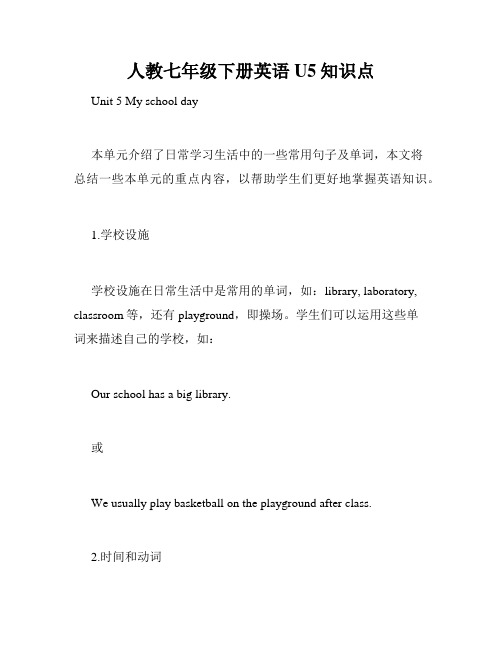
人教七年级下册英语U5知识点Unit 5 My school day本单元介绍了日常学习生活中的一些常用句子及单词,本文将总结一些本单元的重点内容,以帮助学生们更好地掌握英语知识。
1.学校设施学校设施在日常生活中是常用的单词,如:library, laboratory, classroom等,还有playground,即操场。
学生们可以运用这些单词来描述自己的学校,如:Our school has a big library.或We usually play basketball on the playground after class.2.时间和动词时间和动词是英语语言中的重要部分。
在本单元中,有一些常用动词,如:get up, have breakfast/lunch/dinner, go to bed等。
学生们可以运用这些单词来描述自己的日常生活,如下:I usually get up at 6:30 in the morning.I have breakfast at 7 o'clock.I go to bed at 10 o'clock at night.3.日常活动在学习英语的过程中,日常活动也是常用语句。
在本单元中,有一些常用语句,如:It's time to..., I take..., I play..., I do..., 等。
学生们可以运用这些常用语句来叙述自己的日常生活,如下:It's time to go to school now.I take a bus to school every morning.I usually play basketball with my friends after school.I do my homework before dinner.4.一般现在时的动词变化一般现在时在英语语言中也是十分常见的。
七年级下册英语unit5,优秀范文

七年级下册英语unit5,优秀范文
English:
In Unit 5 of the seventh grade English textbook, we learned about different cultures and customs around the world. The unit focused
on how people celebrate holidays and festivals in various countries, such as Chinese New Year, Christmas, and Eid al-Fitr. We also studied different traditional customs, like the Japanese tea ceremony and Indian holi festival. Through this unit, we gained a deeper understanding and appreciation for cultural diversity and the importance of respecting different customs and traditions.
中文翻译:
在七年级英语教材的第五单元中,我们学习了世界各地不同的文化和习俗。
该单元着重介绍了各国人们如何庆祝节日和节庆,比如中国的春节、圣诞节和开斋节。
我们还学习了不同的传统习俗,比如日本的茶道和印度的洒彩节。
通过这个单元,我们对文化多样性有了更深的理解和欣赏,也明白了尊重不同的习俗和传统的重要性。
仁爱版七年级英语下册UNIT5 知识点

仁爱版七年级英语下册UNIT5 知识点本文将为大家介绍仁爱版七年级英语下册UNIT5的知识点,希望能帮助大家更好地学习英语。
一、单词1. beach(n.)海滩2. sea(n.)海洋,海3. swim(v.)游泳4. sail(v.)航行5. island(n.)岛屿6. sun(n.)太阳7. sand(n.)沙子8. shell(n.)贝壳9. wave(n.)海浪10. wind(n.)风11. plane(n.)飞机12. sky(n.)天空13. cloud(n.)云14. weather(n.)天气15. hot(adj.)热的16. cold(adj.)冷的17. windy(adj.)多风的18. rainy(adj.)多雨的19. snowy(adj.)多雪的20. foggy(adj.)多雾的二、句型1. How is the weather? 天气怎么样?2. It’s sunny. 天晴。
3. It’s rainy. 多雨。
4. It’s windy. 多风。
5. The wind is blowing. 风在刮。
6. I like swimming in the sea. 我喜欢在海里游泳。
7. We can see some shells on the beach. 我们在海滩上可以看到一些贝壳。
8. Let’s sail to the island. 让我们航行到那个岛屿。
9. The plane is flying in the sky. 飞机在天空中飞行。
10. The weather is getting hotter and hotter. 天气越来越热了。
三、语法现在进行时现在进行时表示正在进行的动作或者事情,用于描述当前正在发生的事情。
构成:be动词(am, is, are)+动词的ing形式。
例句:1. She is swimming in the sea. 她正在海里游泳。
七年级英语(下册) Unit 5重点词汇和重点短语

七年级英语(下册)Unit5重点词汇和重点短语一、词汇攻关1.building(n.)→build(v.&n.)建筑;体格→built(过去式/过去分词)建造,建设→builder(n.)建立者;建筑者★build sb.sth./build sth.for sb.为某人建造某物★build up建立;增进;增强★of strong build体格健壮的2.train(n.&v.)→trained(adj.)受过训练的;熟练的→trainee(n.)受训练者;实习生→trainer(n.)运动鞋;教练员;驯兽师→training(n.)训练;锻炼;培养;驯化★train sth./sb.to do sth.训练……做……★train for为……接受训练★train as作为……接受训练3.catch(v.)→caught(过去式/过去分词)赶上★catch a cold感冒★catch up with追上,赶上★catch fire着火★catch the train/plane赶上火车/飞机★be caught in the rain淋雨4.ride(v.&n.)→rode(过去式)→ridden(过去分词)骑★give sb.a ride捎某人一程5.watch(v.)→watches(第三人称单数)→watched(过去式/过去分词)观看;当心→watch(n.)表,手表★watch out当心★keep watch(for sth.)看守,警惕★on watch值班★watch TV看电视6.begin(v.)→began(过去式)→begun(过去分词)→beginning(现在分词&n.)开始;开端→beginner(n.)初学者;生手;创始者★begin doing/to do sth.开始做某事★begin with以……作为开始★in the beginning最初,起初★from beginning to end从头到尾7.swim(v.)→swam(过去式)→swum(过去分词)→swimming(现在分词)游泳→swimmer(n.)游泳者★go swimming去游泳★go for a swim去游泳8.listen(v.)→listening(现在分词)听→listener(n.)听者;听众★listen to听;倾听★listen for留神听9.music(n.)→musical(adj.)音乐的→musician(n.)乐手,音乐家,乐师10.talk(n.&v.)→talker(n.)说话者→talkative(adj.)爱说话的,健谈的★talk to/with sb.与某人交谈,谈话★talk about/on…谈论……★talk back(to sb.)顶嘴,回嘴★talk to oneself自言自语★give a talk演讲,讲话11.make(v.)→made(过去式/过去分词)做,制造;使成为→maker(n.)生产者,制造者→making(n.)制作;制造★make sb.sth./make sth.for sb.为某人制作某物★make up编造;和解;化妆;弥补★make it设法安排;成功12.boring(adj.)→bore(v.)使厌烦→bored(adj.)无聊的,无趣的★be bored with sth.对……感到厌烦13.clean(v.&adj.)→cleaning(现在分词)→cleaned(过去式/过去分词)打扫→cleaner(n.)清洁工;吸尘器★do some cleaning打扫卫生★clean up清除;打扫干净14.run(v.)→ran(过去式)→run(过去分词)→running(现在分词)跑→runner(n.)跑步者★run after追赶;追求★run about到处跑15.use(v.&n.)→used(过去式/过去分词)用,使用→user(n.)使用者→useful(adj.)有用的→useless(adj.)无用的★used to do sth.过去常常做某事★be used to doing sth.习惯于做某事★be used to do sth.被用来做某事★come into use开始使用★be in use使用中★use your head动动脑子★make use of利用;使用16.shelf(n.)→shelves(pl.)搁板,搁架→bookshelf(n.)书架17.keep(v.)→kept(过去式/过去分词)保存;保持→keeper(n.)看守人;守卫;守门员★keep away from远离;避开★keep doing sth.持续做某事★keep sb.from doing sth.阻止某人做某事★keep up with跟上18.sit(v.)→sat(过去式/过去分词)→sitting(现在分词)坐★sit down就座,坐下★sit up坐起来;使坐起来19.write(v.)→wrote(过去式)→written(过去分词)写→writer(n.)作家,作者★reading and writing阅读与写作★write(a letter)to sb.给某人写信★write back to sb.给某人回信★write down写下,记下20.wonderful(adj.)→wonder(v.)想知道;感到惊讶→wonder(n.)惊讶;奇迹→wonderfully(adv.)不可思议地;绝妙地★no wonder不足为奇21.history(n.)→historical(adj.)历史的;历史学的;与历史有关的→historic(adj.)有历史意义的;历史上著名的;历史性的22.few(adj.&pron.)→fewer(比较级)较少的→fewest(最高级)最少的★a few几个,一些23.science(n.)→scientist(n.)科学家→scientific(adj.)科学的,有关科学的★science fiction科幻小说24.easy(adj.)→easily(adv.)容易地→easier(比较级)较容易的→easiest(最高级)最容易的→hard/difficult(反义词)困难的★take it easy别紧张25.interesting(adj.)→interested(adj.)感兴趣的→interest(n.&v.)兴趣,爱好;利益,利息;权益;使感兴趣★be/get/feel interested in对……感兴趣★show/have(an)interest in…对……有兴趣★lose interest in…对……失去兴趣★with interest饶有兴趣地26.difficult(adj.)→difficulty(n.)困难★have difficulty(in)doing sth.做某事有困难★without difficulty毫不费力地;轻而易举地27.learn(v.)→learnt/learned(过去式/过去分词)学习,学会;获悉→learner(n.)学习者,初学者★learn to do sth.学会做某事★learn from…从/向……学习★learn sth.by oneself自学★learn…by heart用心学……;背下来28.activity(n.)→activities(pl.)活动★outdoor activities户外运动29.study(v.&n.)→studies(第三人称单数)→studied(过去式/过去分词)学习;研究→study(n.)书房30.early(adj.)→early(adv.)早;提早→earlier(比较级)较早的→earliest(最高级)最早的→late(反义词)迟到的;晚的★catch the early bus赶上早班车★early in the morning清早31.late(adj.)→late(adv.)迟到→lately(adv.)近来★be late for doing sth.做某事迟到了★in the late afternoon傍晚★later in the afternoon下午的晚些时候二、重点短语1.come on快点儿;加油;来吧2.go to school on foot/walk to school步行去上学3.at school在学校,在上课4.the Great Wall长城5.make room for为……腾出个地儿6.dining hall餐厅7.at the school gate在学校门口8.by bus/car/subway乘公共汽车/小汽车/地铁9.on weekdays在工作日10.take the bus/train/plane/car乘坐公交车/火车/飞机/小汽车11.listen to music听音乐12.do one's homework做家庭作业13.go to bed上床睡觉14.the same to you你也一样15.three times a week一周三次16.do some cleaning打扫卫生17.ride a bike骑自行车18.once/twice a week每周一次/两次19.know about了解,知道20.on Thursday morning在周四上午21.be over结束22.in one's free time在某人的业余时间23.play cards打扑克牌24.classroom building教学楼25.on time按时;准时26.borrow…from…从……借来……27.show sb.around带某人参观28.have a soccer game有一场足球赛29.in the swimming pool在游泳池30.write(a letter)to sb.给某人写信31.at the back of…在……的后面32.have an English class上英语课33.learn about the past了解过去34.a map of China一幅中国地图35.work on math problems算数学题36.be kind to sb.对某人友好37.some other subjects一些别的科目38.different kinds of…不同种类的……39.watch a movie/see a film看电影40.study English grammar学习英语语法41.care about关心;在乎42.play computer games玩电脑游戏三、重点句型1.It's time for e on!上课时间到了,快点!2.I seldom walk to school.我很少步行上学。
七下英语unit5单词表

七下英语unit5单词表人教版七年级下册英语Unit 5单词表。
一、重点单词。
1. panda [ˈpændə] n. 熊猫。
2. zoo [zuː] n. 动物园。
3. tiger [ˈtaɪɡə(r)] n. 老虎。
4. elephant [ˈelɪfənt] n. 大象。
5. koala [kəʊˈɑːlə] n. 树袋熊;考拉。
6. lion [ˈlaɪən] n. 狮子。
7. giraffe [dʒəˈrɑːf] n. 长颈鹿。
8. animal [ˈænɪml] n. 动物。
9. cute [kjuːt] adj. 可爱的;机灵的。
10. lazy [ˈleɪzi] adj. 懒散的;懒惰的。
11. smart [smɑːt] adj. 聪明的。
12. beautiful [ˈbjuːtɪfl] adj. 美丽的;美好的。
13. scary [ˈskeəri] adj. 吓人的;恐怖的。
14. kind [kaɪnd] n. 种类。
15. kind of 稍微;有点儿。
16. Australia [ɒˈstreɪliə] n. 澳大利亚。
17. south [saʊθ] adj. 南方的n. 南;南方。
18. Africa [ˈæfrɪkə] n. 非洲。
19. South Africa 南非。
20. pet [pet] n. 宠物。
21. leg [leɡ] n. 腿。
22. cat [kæt] n. 猫。
23. sleep [sliːp] v. & n. 睡觉。
24. friendly [ˈfrendli] adj. 友好的。
25. shy [ʃaɪ] adj. 羞怯的;腼腆的。
26. save [seɪv] v. 救;救助。
27. symbol [ˈsɪmbl] n. 象征。
28. flag [flæɡ] n. 旗;旗帜。
七年级英语下册Unit5知识点汇总

七年级英语下册Unit5知识点汇总Unit5ourSchoolLifeTopic1一、重点词语:aeup醒来,唤醒getup起床gotoschool去上学gohoe回家godancing/shopping/sating/siing去跳舞;购物、滑冰;游泳godoingsoething可用于表达去进行某种娱乐休闲活动。
表示交通方式:onfoot步行byboat坐船byship坐船byair乘飞机byplane乘飞机bytrain坐火车bysubay搭乘地铁bycar坐小汽车bybus坐公共汽车bybie骑自行车taethesubay/bus/car搭乘地铁;公共汽车;小汽车driveacartoor=gotoorbycar驾车去上班taeabustoor=gotoorbybus乘公共汽车去上班gotoschoolonfoot=altoschool步行去上学rideabie/horse骑自行车;骑马afterschool/class放学以后;下课以后playthepiano/guitar/violin弹钢琴;吉他;小提琴playbasetball/soccer/football打篮球;踢足球;打橄榄球playputergaes玩电脑游戏playithaputer玩电脑playsports做运动0.nextto紧挨着,在…旁边1.aplanofyschool一幅我们学校的平面图oneedays在工作日ateeends在周末3.havebreafast/lunch/supper/dinner/eals吃早餐;中餐;晚餐;正餐;一日三餐haveclasses/lessons/aeeting上课;上课;开会atchTV/ovies/gaes/theanials看电视;电影;比赛;动物readnovels/nespapers/boos看小说;报纸;书ashone’sface/clothes洗脸;衣服反义词:up–don,early–late近义词:quicly–fast getupearly早起belatefor迟到thefirst/second/third/fourthday;二;三;四天cleanthehouse打扫房子表示建筑物:ontheplayground在操场atschool/hoe/table在学校;家里;桌旁inaputerroo/teachers’office/classroobuilding/gy/library/lab/canteen 在电脑室;教师办公室;教学楼;体操馆;图书馆;实验室;食堂0.aroundsixo’cloc=ataboutsixo’cloc大约在六点1.频率副词:never,seldo,soeties,often,usually,alays二、重点句型:It’stietogetup.该起床的时候了。
- 1、下载文档前请自行甄别文档内容的完整性,平台不提供额外的编辑、内容补充、找答案等附加服务。
- 2、"仅部分预览"的文档,不可在线预览部分如存在完整性等问题,可反馈申请退款(可完整预览的文档不适用该条件!)。
- 3、如文档侵犯您的权益,请联系客服反馈,我们会尽快为您处理(人工客服工作时间:9:00-18:30)。
2.那只熊猫来自中国。 The panda come from china. 难道那只熊猫不是来自中国吗?
Isn’t the panda from china?
Yes,she is./No,she isn’t
D. Which
5. ______ a year does your school have sports meetings? Twice a year. A. How often B. How soon C. How long D. How manynorthestnortheast
southwest
2. ______ is a ticker for the film Hacker He? - About forty yuan . A. How old B. How many C. How much D. How often 3. —______ are you going? — I’m going to the library. A. Who B. Which C. What D. Where 4. ______ tea did you have? A. How many B. How much Two cups. C. How soon
southeast
1. -Isn’t Lin Tao late for school today? -______.After he came into the classroom the bell rang. A. Yes,he is B. Yes,he isn’t C. No,he isn’t D. No,he is
It’s an elephant.
It’s a lion.
It’s a tiger.
It’s a koala.
特殊疑问句是以特殊疑问词开头的,回答必须是明确的,不可 以简单地用yes或no来回答。常见的特殊疑问词有 why,where,when,who,what,how以及由“how+形容词/副词”构 成的短语。
It’s scary. It eats meat. tiger It is a _______.
It is kind of shy.
It likes eating bamboo. panda It is a ________.
Guess what animal it is.
It’s a panda.
特殊疑问词 why where when who/whom 功能 提问原因 提问地点 提问时间 提问人
what how how+形容词/副词
提问事物 提问方式、方法 提问频率、价格、时间、长度、 距离等
1. Excuse me ______ is the nearest bookshop ? Go down the street and turn left at the second corner? A. how B. what C. where D. who
